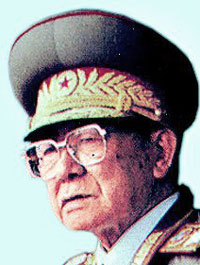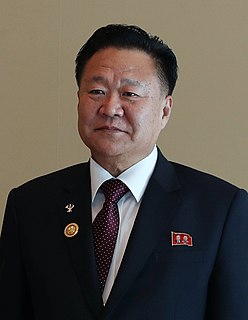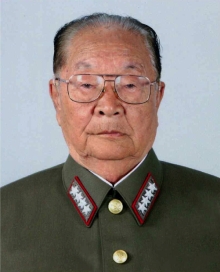 W
WMarshal Choe Kwang was a prominent military leader in North Korea.
 W
WChoe Ryong-hae is a North Korean politician and military officer who currently serves as Chairman of the Standing Committee of the Supreme People's Assembly and First Vice President of the State Affairs Commission, holding both positions since April 2019.
 W
WHwang Pyong-so is a North Korean general and politician who held the rank of Vice Marshal in the Korean People's Army (KPA). He was a member of the Presidium of the Workers' Party of Korea and the top-ranking vice-chairman of the State Affairs Commission.
 W
WHwang Sun-hui was a North Korean politician who served in several high-ranking positions in the Workers' Party of Korea (WPK), including in the Supreme People's Assembly and the Central Committee of the WPK. She was affiliated with the Korean Revolution Museum from 1965, and was its director from 1990.
 W
WJo Myong-lok was a North Korean military officer who held the military rank Chasu. In 1998, he was appointed First Vice-Chairman of the National Defence Commission of North Korea, Director of the Korean People's Army General Political Bureau. Previously, he was the commander of the air defence forces.
 W
WJon Pyong-ho was the Chief Secretary of the Korean Workers Party (KWP) Committee of the North Korean Cabinet, and director of the DPRK Cabinet Political Bureau before his retirement in 2010. Jon was described as the 'Chief architect of North Korea's nuclear programme'. Jon was a general of the Korean People's Army(KPA) and a close adviser to late Kim Jong-il.
 W
WKim Il-chol is a former member of the North Korean National Defence Commission of North Korea and former Minister for Defence.
 W
WLee Sang-jo (1915–1996) was a politician and soldier from the Democratic People's Republic of Korea. He was also known under the name Taek-Myung Kim (金澤明).
 W
WO Jin-u was a general and politician of North Korea. He was the Minister of Armed Forces from May 1976 until his death in February 1995. O was considered the third most powerful person in North Korea, after Kim Il-sung and his son Kim Jong-il, therefore making him the most powerful person that possessed no blood relations to the Kim family. Very little is known about him except for the fact that he served with Kim Il-sung's partisan unit and eventually rose through the ranks of the North Korean Army. Thanks to His relationship with Kim Il-sung, O Jin-u was able to enjoy wealth and fame, this lasted even under Kim Jong-il. He distinguished himself during the Korean War and was a trusted adviser of the North Korean leader until his death, also being his chief guard in 1945.
Pak Kum-chol was a North Korean politician. Having been a guerrilla during the anti-Japanese struggle, he became a high-ranking politician after the liberation of Korea. Pak aligned himself with his former guerrilla brothers in arms from the Kapsan Operation Committee to form a faction within the ruling Workers' Party of Korea (WPK) called the "Kapsan faction". This faction sought to replace Kim Il-sung with Pak. Kim retaliated by purging the faction in 1967 in what is known as the Kapsan Faction Incident. Pak was sent to work at a factory in the countryside and was either executed or committed suicide in May 1967.
 W
WPak Kyong-suk was a North Korean politician. She was a seamstress in Kim Il-sung's guerrilla forces during the 1930s. After the liberation of Korea, she held posts in the Workers' Party of Korea (WPK), Democratic Women's League, as well as being a delegate to the Supreme People's Assembly.
 W
WRi Ul-sol was a North Korean politician and military official. He played an important role in the administrations of Kim Il-sung and Kim Jong-il, achieving the rank of Marshal of the Korean People's Army. He was responsible for the safety of top North Korean leaders and their families as Commander of the Guard.
 W
WYon Hyong-muk, also spelt Yong Hyong-muk, was a long-serving politician in North Korea and at the height of his career the most powerful person in that country outside the Kim family. He was Prime Minister of North Korea from 1988 to 1992.